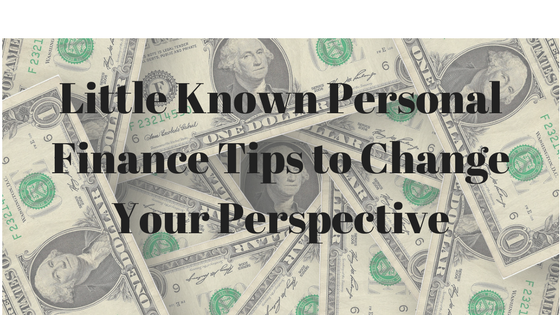
If you’ve heard the common financial advice once, you’ve heard it 100 times. Here’s a few tips that you might have not heard before? Sometimes when you see a new perspective, perhaps it will generate new ideas, thoughts, and actions. A new perspective may just change your financial future.
Consider these financial tips to change your financial outlook:
1. Modern cars last much longer than five years.
After all, it’s just a combination of metal and plastic that rolls along on four tires. If possible, avoid attaching your ego to your automobile. Driving your car for more than a few years can save a lot of money at the end of the day. Instead, redirect that new car payment into your retirement account and see what happens.
2. Be prepared for unexpected expenses.
Here are just a few common financial emergencies. Have an emergency fund so you are prepared for what could happen?
● Home repairs, such as replacing a furnace or a leaky roof
● Major car repairs
● Funeral-related costs and travel expenses
● Medical bills
● Loss of income (job loss)
3. Allocate five minutes to review your finances each day.
Just one TV commercial break is all it takes. Go over your financial transactions for the day and follow up on any discrepancies.
4. Create small money goals that are easy to accomplish. A few ideas:
● I’ll spend less than $35 (per family member) a week on groceries for the next month.
● I’ll deposit $25 into a savings account each Friday.
5. Obtain a renter’s insurance policy.
A few dollars each month is all it takes to ensure that you can replace everything you own in case of theft or fire.
6. Find free ways to entertain yourself.
Most of the time, spending money only serves the purpose of making yourself feel better. Instead of distracting yourself with purchases that you don’t need, discover some free forms of entertainment.
● Books and video rentals from the library
● Find free concerts or listen to your favorite music at home
● Play with a frisbee
● Card games with friends
● Spend time exercising
● Meditate
● Plant and tend to a garden
7. Focus on paying off your small debts first.
You will build momentum while feeling a greater sense of accomplishment. You could also pay off the debt with the highest interest rate first. That makes more financial sense but may not form good habits through the rewarding feeling of a $0 balance.
8. Consider the overall cost of using an item.
Most people balk at the cost of an expensive mattress, but you literally spend ⅓ of your life lying on it. By that metric it should be one of the most expensive things you own!
● What is the cost to drive a $75,000 Mercedes each day? Even after just 5 years, roughly 1800 days, you’d be lucky to sell the car for 50% of what you paid for it. $37,500/1800 = $21/day. This doesn’t even include the cost of insurance, interest on monthly car payments, gas, or maintenance.
9. Don’t put too much money in a savings account.
Unless you need the money for an expense in the very near future, there are much better places to put your money. Put some of your money to work for you by investing it. Make a list and choose the one that makes the most sense and is in alignment with your goals.
10. Think of a financial mantra to support your financial goals and say it each day.
● I never pay full price.
● I only buy things I absolutely need.
● I am an investor.
● I save at least 10% of my income.
A dash of unconventional advice can be a very good thing. It can open your mind to new ways of looking at old challenges. You may find solutions that you otherwise would have never considered.




No comments yet.